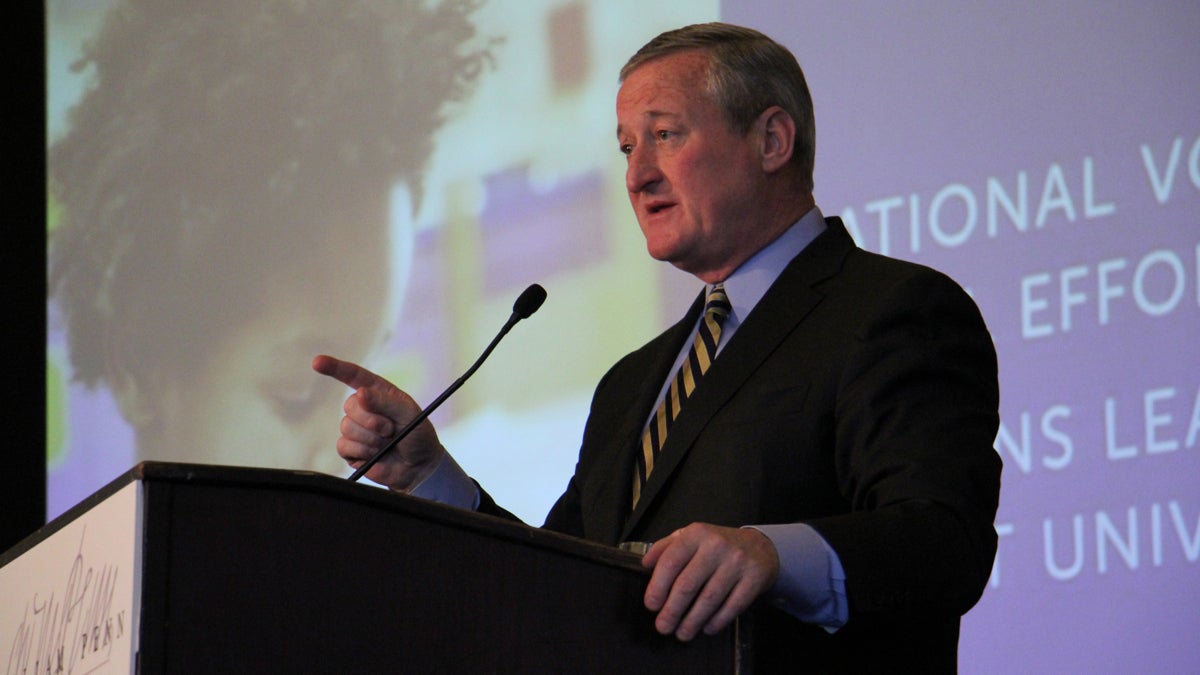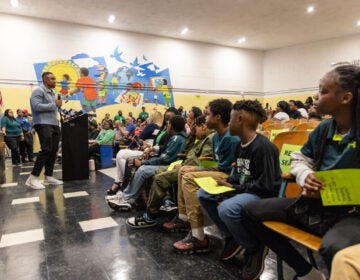Kenney stumps for soda tax at pre-K gathering
Listen
Philadelphia Mayor Jim Kenney makes his case for quality pre-K during a conference hosted by the William Penn Foundation at the Downtown Marriott in Center City. (Emma Lee/WHYY)
In a fiery address to early childhood education advocates, Philadelphia Mayor Jim Kenney stumped for the sugary beverage tax he’s seeking to fund quality pre-K and bashed the levy’s opponents.
His targets during the 10-minute address included the beverage industry, repeatedly, and even an esteemed member of his own party. In a particularly pugnacious moment, Kenney advised former Philadelphia mayor and Pennsylvania Gov. Ed Rendell to “keep his mouth shut.”
Rendell recently questioned whether it was wise to impose a tax that singles out the beverage industry and could disproportionately fall on poor consumers.
Kenney’s response to the critics: “These companies have advertised and marketed for generations in poor, underserved neighborhoods. They have made their billions off of poor, underserved neighborhoods.”
Kenney’s remarks kicked off the fourth session of “Quality Talks,” a series of panel discussions convened by the William Penn Foundation. The event featured national leaders on early childhood education and higher-ups from cities that have aggressively moved to expand pre-K, with the hope of swapping ideas on how to best roll out new programs.
Among the main ideas that emerged was to focus on the quality of pre-K before focusing on the quantity.
“I like to say quality pre-K as opposed to universal,” said Kenney “Because universal’s important, but quality is more important than universal.”
Ted Dallas, secretary of the state Department of Human Services, and Libby Doggett, who runs the Office of Early Learning for the federal Department of Education, echoed Kenney’s sentiments. Both pointed to Florida as a cautionary tale. The Sunshine State implemented universal pre-kindergarten without ensuring seats would be high quality, according to Doggett and Dallas.
“Stick with the quality,” said Doggett. “We’d rather have fewer seats and have them high quality.”
It would appear Philadelphia’s leaders are heeding that suggestion. An April report released by the Philadelphia Commission on Universal Pre-Kindergarten cautioned against a full rush into comprehensive early childhood education for the city’s 3- and 4-year-olds.
“While it is in the City’s best interest to move towards a universal system, the City’s limited resources should be used initially in areas with the highest concentrations of poverty and the lowest number of quality pre-K slots,” the commission wrote. The report endorsed a “targeted” approach toward growing the city’s early childhood offerings and recommended that all new seats “meet rigorous quality standards.”
By the commission’s definition, high-quality programs must hire well-trained teachers and use evidenced-based learning standards. Head Start, Pre-K Counts, and programs accredited by the National Association for the Education of Young Children all meet the commission’s criteria. So too do child care centers that have earned either three of four stars in the state’s Keystone STARS rating system.
The extent and speed of the city’s pre-K expansion efforts will hinge on funding. Kenney has proposed a 3 cent-per-ounce tax on sugar-sweetened beverages. City Council is expected to vote on that proposal before the current session ends on June 16. A fierce public relations war has erupted over the “soda tax,” but few at Wednesday’s panel seemed eager to engage in it.
“I don’t have a position on that,” said Dallas. “If folks wanna give us more money to spend on kids, I’ll be happy to spend it.”
The event’s hosts were also reluctant to wade in.
“The foundation doesn’t have a position on [the beverage tax],” said Elliot Weinbaum, program director with the William Penn Foundation.
Marian Wright Edelman, a renowned early childhood advocate and founder of the Children’s Defense Fund, was an exception to the soda-tax agnosticism.
“This is a very modest tax,” Edelman said. “It will make a huge difference in the lives of thousands of children.”
Edelman also sees Philadelphia as a potential trailblazer for similar initiatives across the country.
“This is an opportunity for Philadelphia to really shine and to help us start a domino effect,” she said.
WHYY is your source for fact-based, in-depth journalism and information. As a nonprofit organization, we rely on financial support from readers like you. Please give today.





